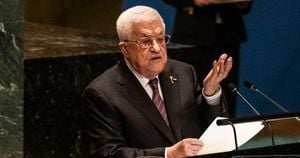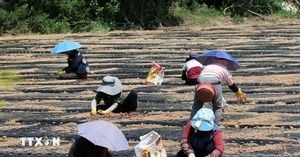In recent weeks, a wave of hunger strikes has rippled through prisons in the United Kingdom, United States, and Bahrain, drawing renewed attention to the plight of political prisoners and the ongoing struggle for Palestinian solidarity. These acts of resistance, often carried out quietly behind bars, have become a powerful rallying cry for activists and human rights campaigners across the globe.
At the center of this movement is T. Hoxha, a Palestine activist who has been imprisoned for nine months without trial in the UK, according to reporting from Prisoners 4 Palestine. Hoxha’s incarceration stems from her alleged involvement in the so-called Filton 24 case, which is tied to a direct action protest at the site of Israeli arms manufacturer Elbit Systems in Filton in April 2024. The group Palestine Action, of which Hoxha is a member, has been at the forefront of campaigns targeting companies accused of supplying arms used in the ongoing conflict in Gaza. In a move that has sparked controversy and debate, British authorities recently proscribed Palestine Action, citing concerns over its tactics and links to property damage.
Hoxha’s hunger strike at Peterborough Prison began on August 11, 2025. Her demands are simple yet telling: she wants to return to her job at the prison library and receive all the mail that has been withheld from her. As of August 26, two of her three demands had been met, but she remained steadfast in her refusal to eat, insisting on the release of her withheld correspondence. Her case has become emblematic of the broader challenges facing those who engage in direct action for Palestine, as well as the punitive measures often faced by activists in Western countries.
Hoxha’s struggle has not gone unnoticed. In the United States, Casey Goonan, a political prisoner charged with firebombing a police vehicle at UC Berkeley during protests against university complicity in the conflict, learned of Hoxha’s hunger strike and decided to join her in solidarity. Goonan, along with a cellmate at Santa Rita Jail, began their own hunger strike on August 26. In a statement cited by Prisoners 4 Palestine, Goonan declared, “Today I learned about T Hoxha, a Pal Action prisoner in the UK who is on day 16 of their hunger strike at HMP Peterborough. As of 4pm eastern time, August 26, 2025, 2 out of 3 of her demands have been met, but she is still on strike to demand that the prison release the mail they have been withholding from her.”
Goonan’s message went further, connecting the dots between the struggles of activists imprisoned in the West and those held in Israeli jails: “As captives imprisoned for our participation in the Palestinian liberation movement in the west, we have a responsibility to each other across borders to pursue our lives in prison with the same steadfastness as the Palestinian Prisoners movement held captive in ‘Israeli’ prisons. The states we have been captured by are the enablers of the Zionist entity’s accelerated genocide of Palestinians, as well as the ongoing genocides of black and indigenous people who’s lands they continue to occupy.”
The hunger strikes have become a symbol of transnational solidarity, highlighting the interconnectedness of struggles against what activists describe as imperialist and colonial systems. Goonan’s statement underscored the sense of isolation and urgency felt by those on the front lines: “As the Western left continues to move from crisis to crisis, avoiding their responsibilities to Palestine, we are all that we have. By we I am referring to people facing repression for their support for Palestine, the people who are truly sacrificing. Such as T Hoxha, who has suffered through 16 days of starvation just to get her mail.”
These acts of resistance have prompted calls to action from advocacy groups and supporters. Campaigners have urged the public to contact the governor of HMP Peterborough and demand that Hoxha’s final demand be met. “Solidarity with T Hoxha and all prisoners of the Palestine Solidarity movement! Raze the walls! Liberate all prisoners of the settler empire!” Goonan’s statement concluded, echoing the rallying cries of international solidarity movements.
Meanwhile, in Bahrain, a similar story is unfolding. Hussein Ali Mahna, a political prisoner, has entered his 11th consecutive day of hunger strike as of August 29, 2025, in solidarity with the Palestinian people, according to Reuters. Mahna’s health has reportedly deteriorated significantly, with severe weakness and multiple transfers to the prison clinic for urgent care. Human rights activists have sounded the alarm, urging Bahraini authorities to provide proper healthcare, respect the right to peaceful protest, and release Mahna and other political detainees imprisoned for non-violent activism.
The situation in Bahrain is part of a broader pattern, activists argue, in which governments in the region and beyond respond to dissent and solidarity with harsh repression. Mahna’s case has become a touchstone for those advocating for the rights of political prisoners, with international organizations highlighting the urgent need for medical care and due process.
The hunger strikes of Hoxha, Goonan, and Mahna are not isolated incidents. They are part of a wider movement of resistance that includes calls for the release of numerous prisoners associated with Palestine solidarity and liberation movements. These include the Filton 24, Anan Yaeesh, Elias Rodriguez, Jakhi McCray, Tarek Bazrouk, Ghassan Elashi and Shukri Abu Baker of the Holy Land 5, as well as prominent Black liberation activists such as Mumia Abu Jamal, Imam Jamil al-Amin, Joseph Bowen, Fred Burton, Veronza Bowers, Kojo Bomani Sababu, and Kamau Sadiki. Activists also point to the plight of the 16 Lebanese and dozens of Syrian prisoners held in Israeli jails, and the over 10,800 Palestinian prisoners who, according to advocacy groups, face systematic abuse, torture, and deprivation.
Human rights organizations have consistently called for the humane treatment of political prisoners and respect for their rights to protest and receive medical care. In the case of Mahna, activists have reiterated the urgent need for intervention, warning that his life could be at risk if his hunger strike continues without adequate medical support.
For many observers, the hunger strikes serve as a stark reminder of the deeply personal sacrifices made by those who take a stand for justice, often at great personal cost. Behind the headlines and political debates are individuals who, despite facing isolation and deprivation, continue to resist through the only means available to them. The solidarity expressed across borders, from the UK to the US to Bahrain, underscores the enduring power of collective action—even in the most constrained circumstances.
As the hunger strikes continue and calls for action grow louder, the fate of T. Hoxha, Casey Goonan, Hussein Ali Mahna, and countless others remains uncertain. What is clear, however, is that their acts of resistance have sparked a renewed conversation about justice, solidarity, and the rights of political prisoners worldwide.





